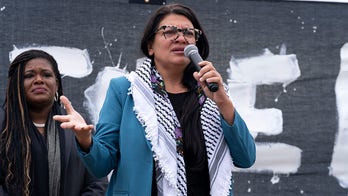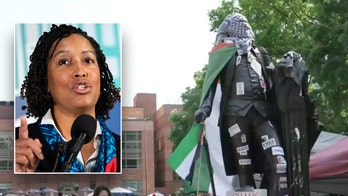Same-sex binational couple talks DOMA a year after the decision
Julio Alegria and Michael Penn talk about how the DOMA decision changed their lives.
For Julio Alegria and his husband Michael Penn, the date of June 26, 2013 will forever be etched in their hearts.
On that day, by a 5-4 decision, the Supreme Court ruled that the federal Defense of the Marriage Act (DOMA), which defined marriage as a union between a man and a woman, was unconstitutional.
“(Our lives) changed so much,” Alegria told Fox News Latino. “It’s something so beautiful what you feel when they tell you you are welcome in this country… It’s an amazing feeling.”
The DOMA decision – also known as the Windsor decision – gave married gay and lesbian couples the same federal rights as other married couples. It also gave couples like Alegria and Penn something else: a chance at permanent legal residency in the United States. Alegria, a Mexican on a student visa, had fallen in love and wanted to marry his American partner so he could stay in the U.S. — but he wasn't able to do so before DOMA.
While proponents of gay marriage have been winning court victories in state after state, one part of the ruling quietly gaining momentum and generating controversy is that many gays are now able to qualify for legal residency if they marry their same-sex partner.
Proponents say it's an important part of the law because many who were undocumented and fell in love had few legal options to stay in the country.
“(LGBT binational couples) did whatever they could to stay together even at the risk of being undocumented,” said DOMA Project co-founder and immigration lawyer Noemi Masliah. “As a result, families were separated and Americans would go into exile to stay with their spouses.”
But opponents say among the issues they have with DOMA is that it further strains an immigration system already riddled with problems.
Dan Stein, president for the Federation of American Immigration Reform (F.A.I.R), said DOMA will increase the overall flow of immigrants into the U.S. through spousal benefits, though the biggest impact will be on the strain to law enforcement investigating fraud.
“It was done without any public input or real analysis,” he told FNL, adding that the Obama administration is interpreting the Supreme Court decision in federal immigration benefits. “The level of public awareness (on this issue) is below zero.”
Stein added that the true impact of the DOMA decision on immigration is unknown, but that it complicates things and will give U.S. gay and lesbian citizens a new dimension to fast track to citizenship.
Running Out of Legal Options
Alegria, 35, first arrived to New York from Mexico City as a ballet dancer on a student visa in 2002. He said he did not plan on staying in the country after finishing school, but he ended up meeting Penn, 44, while working at the Bronx Opera Company. They fell in love.
“Immediately (we) knew it would be tough because he was on a student visa and it was expiring,” Penn said.
For nearly a decade, Alegria was in the country legally as a full-time student, but he could not work nor travel outside of the country. As he approached graduation, and with his legal options dwindling, he and Penn decided to tie the knot in January 2013.
“So we tried everything. I wrote almost every politician I could think of,” Penn said. “I think we always knew that the Supreme Court would hear a case like this and we were just anticipating it for almost nine years.”
Masliah of the DOMA Project said Alegria and Penn’s story was not unique and, rather, a very typical one for the more than 24,000 same-sex binational couples currently living in the U.S.
“These couples were pioneers,” Masliah said. “It took so many years with many desperate for solutions… They are still pinching themselves.”
But foes of same-sex marriage said they would continue to fight until they reversed the trend of same-sex marriages. Among them is the National Organization for Marriage (NOM), whose members recently held a march in Washington and have engaged in successful campaigns against gay marriage.
Brian Brown, NOM’s president, said over the past year they have continued their work to protect marriage and that the opposition had been feeding people a big mess of lies. He said the number of people at the march – he claims about 10,000 showed up – are proof that people think the same way they do.
“It was amazing,” Brown said. “The diversity (was the best). We had blacks, whites, Hispanics, Christians, Catholics, Orthodox Jews.”
Currently, 19 states have laws in place where same-sex couples can marry. In addition, judges in 12 states have issued rulings in favor of same-sex marriage, with many of these rulings are now stayed as they proceed to appellate courts.
Brown said that if the Court does not rule in their favor, it does not mean they are going away.
“You think Catholics are going to forget what they know is right? Or Orthodox Jews,” he said.
‘Happiest Day Of Their Lives’
Alegria and Penn say they are just two men who fell in love – and deserve the same rights and benefits as anyone else.
Since the DOMA decision, they, along with several dozen other couples, have successfully applied for permanent residency. Alegria said it was the most nerve-racking day and the happiest day of their lives when they received the immigration paperwork.
“We have a different life now. We dream more,” he said with a smile.
Follow us on twitter.com/foxnewslatino
Like us at facebook.com/foxnewslatino





